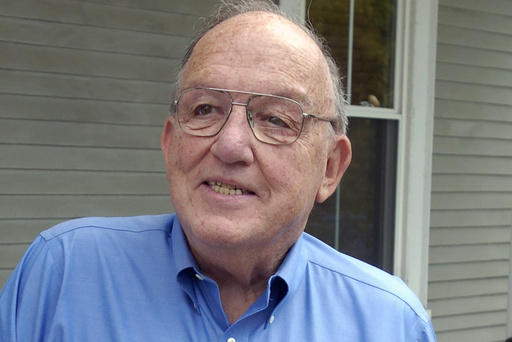NEW YORK — Fay Vincent, who unexpectedly took on the role of baseball commissioner in 1989 after A. Bartlett Giamatti’s demise and later lost his position three years later amid tensions between owners and players, has passed away at the age of 86.
Vincent had been battling bladder cancer and underwent both radiation and chemotherapy before experiencing serious complications, including bleeding, as reported by his wife, Christina. He made the decision to discontinue treatment and passed away on Saturday at a hospital situated in Vero Beach, Florida.
Current Commissioner Rob Manfred acknowledged Vincent’s service to baseball during challenging times, expressing that he remained proud of his contributions to the sport throughout his life in a statement.
Vincent transitioned from a practicing lawyer to a corporate executive in the film industry at the urging of a college acquaintance. He had been retired for three decades, splitting his time between residences in New Canaan, Connecticut, and Vero Beach.
During his tenure as commissioner from 1989 to 1992, Vincent’s leadership was characterized by what he termed “three-cigar days,” a reference to challenging moments that irked team owners. He became the first top official to acknowledge collusion among franchises against free agents after the 1985, 1986, and 1987 seasons. His decisions included suspending George Steinbrenner of the Yankees and dividing expansion fees between the two leagues. He also endeavored to adjust National League alignments and played a key role in settling a spring training lockout in 1990.
Reflecting on his tenure, Vincent voiced his belief that being the commissioner was a public trust and that he aimed to act in the best interests of baseball and its fans. He expressed mixed feelings about his achievements, specifically lamenting his inability to foster a constructive relationship between owners and players, a regret he held deeply.
Vincent was born on May 29, 1938, and worked as a securities attorney before his entry into film production in 1978 with Columbia Pictures. His friendship with Allen from their college days at Williams College led him to this opportunity. He held executive titles there for around a decade before entering into baseball under Giamatti’s leadership, during which he oversaw a significant gambling investigation involving Pete Rose.
Following Giamatti’s untimely passing from a heart attack, Vincent was elected by owners to succeed him just days later, securing a term expected to last four and a half years. His first World Series faced an interruption due to the Loma Prieta earthquake, striking minutes before Game 3 was set to begin at San Francisco’s Candlestick Park, receiving acclaim for the thoughtful delay before the series resumed.
As commissioner, Vincent’s initial full season began after a contentious 32-day lockout during spring training. His subsequent agreement displeased owners, especially those led by Bud Selig, who sought more control. In a significant move in July 1990, he signed an agreement with Steinbrenner, compelling the Yankees’ owner to step down due to inappropriate dealings with a gambler.
Vincent’s initiatives included redefining how expansion fees would be shared and calling for player contribution equity during expansion drafts. He also saw efforts to realign league divisions, which ultimately faced resistance and litigation.
With increasing dissent from owners, particularly Selig and Jerry Reinsdorf, Vincent faced a special meeting that led to a significant vote of no confidence against him in September 1992. After careful consideration, he resigned from his position shortly thereafter.
Vincent later remarked about the conflicts between fan interests and owner perspectives, illustrating the complexities of his role.
Selig was then appointed as interim commissioner and later officially became commissioner in 1998, serving until his retirement in 2015. After stepping down, Vincent sought relaxation in England, where he rented a historic residence associated with a former British Prime Minister, often enjoying visits from friends and acquaintances.
Born in Waterbury, Connecticut, he had a father who excelled in sports at Yale and a mother dedicated to homemaking. A severe accident during college nearly derailed his academic path but he triumphed, graduating with honors.
Vincent embarked on his legal career at a prestigious firm and later transitioned to roles of increasing responsibility in both finances and film production. His leadership at Columbia Pictures was marked by significant accomplishments, including successful film releases.
Even with his corporate success, his heart remained with baseball, and he was involved in numerous initiatives aiming to promote its history and statistical integrity.
Vincent married Valerie McMahon in 1965, becoming a father to three children. After their divorce in 1994, he remarried Christina Watkins in 1998, continuing to lead an impactful life and leaving a legacy in both sports and corporate realms.



